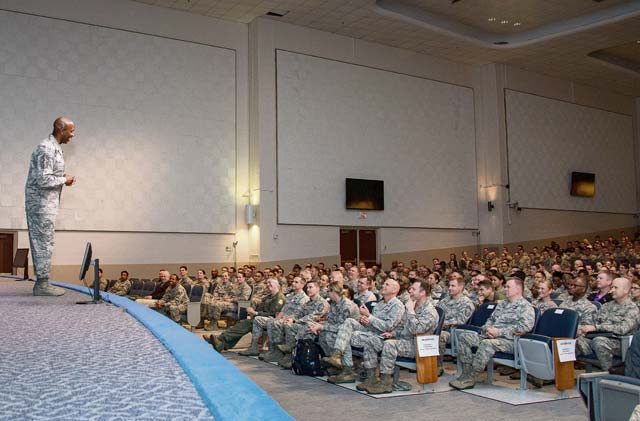
MAXWELL AIR FORCE BASE, Alabama — Chief Master Sergeant of the Air Force Kaleth O. Wright said he feels the Air Force is headed in the right direction concerning education and enlisted-force structure, but Airman resilience is an area that needs more attention.
He’s starting the new year with that focus, he told the crowd during an all-call
Jan. 10 in Polifka Auditorium at Maxwell Air Force Base.
“What I’m most concerned about, and where my priority will be in 2018, is the area of resilience,” he said. “I still feel like there’s work to be done. I want to get out there and spend more time and energy this year getting after what’s causing our Airmen to be less resilient. What’s causing us to have less of a wingman culture?”
His desire to see the Air Force go back to more of a “wingman culture” stems from strong personal relationships that helped him get through difficult times. He said support from fellow Airmen and building a strong sense of resilience is key to what he predicts will be a tougher operations tempo in the future.
“The reason I’ve decided to place this laser focus on resilience is because … it gets tougher,” he said. “It’s tough now, but it gets tougher. With what’s happening in the world with the level of global insecurity and instability, our jobs will only get tougher. I don’t look out a year or two or three from now and see less mission. I see more deployments to Europe. I see more deployments to Africa. I see continued deployments to the Middle East, and I also see, at some point, some deployments to the Pacific.”
The chief pointed to not only the strain on those on the deployments but also the strain on the families left behind and the Airmen who remain to continue the mission.
“The mission here never stops, and the folks who are left behind are the ones who have to pick up the slack,” he said.
Finding the correct work-life balance, the chief said, is key to building better resilience.
“A big goal of mine is to be able to give you as much time back as possible,” he said. “I want you to be able to focus on the mission. I want you to be able to take care of each other and take care of yourselves. And I want you to be able spend time with your family. Family time is very important.
To find that balance between focusing on the mission, one’s self and personal relationships, Wright introduced what he called the “2-10-5-7 philosophy.”
The philosophy is a way to structure time: two hours of personal time in the morning, 10 hours for work, five to family and other personal relationships, and the remaining seven to sleep.
He emphasized the five hours to family should be “uplugged,” referring to smartphones and social media. He admitted the five hours unplugged was his greatest struggle in trying to follow the regiment.
“I won’t say I’ve been successful, but I’ve made a conscious effort to maintain more balance.”


